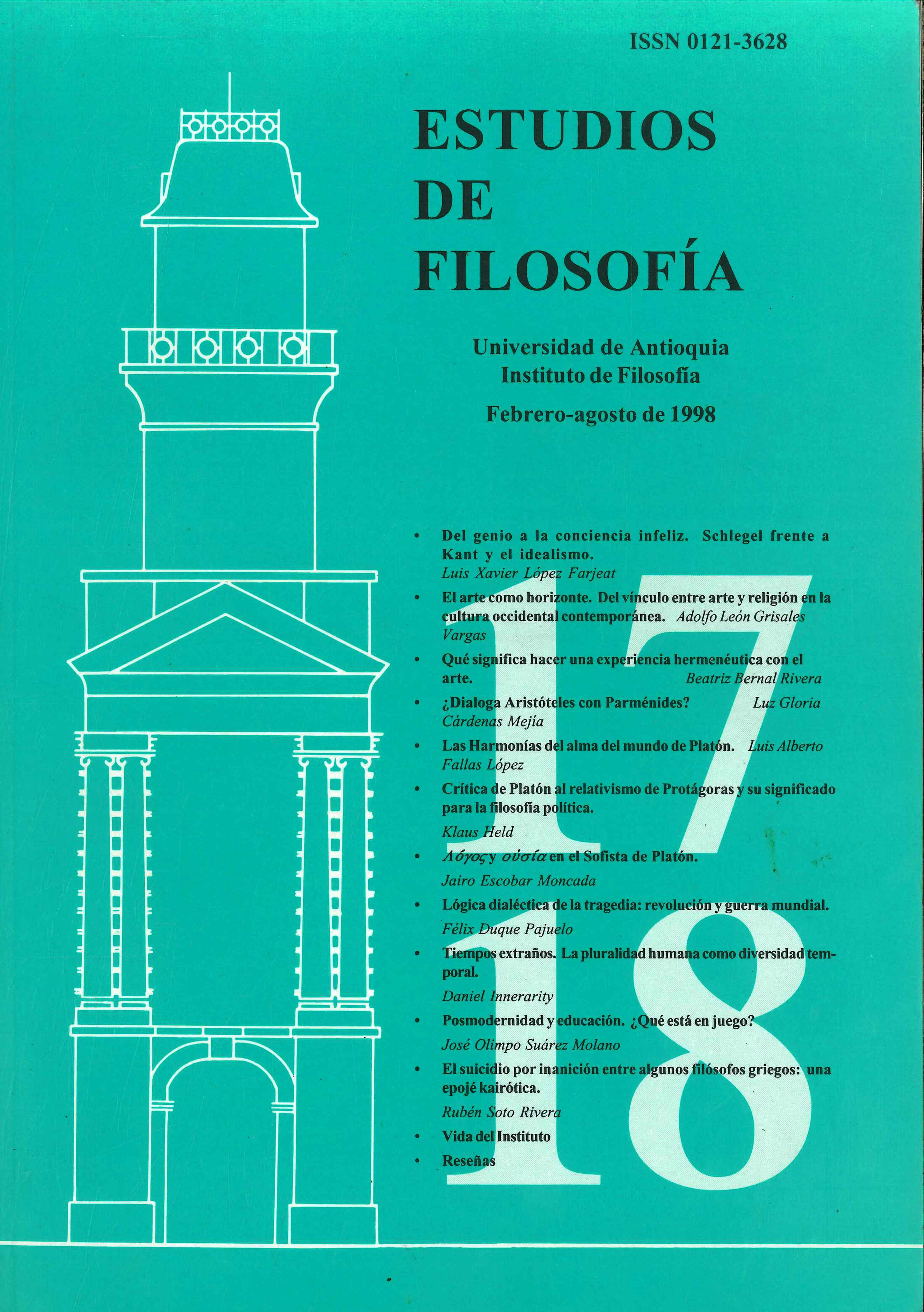El suicidio por inanición entre algunos filósofos griegos. Una epojé kairótica
DOI:
https://doi.org/10.17533/udea.ef.338012Palabras clave:
suicidio, inanición, epojéResumen
A través de la historia de la antigua filosofía griega hubo algunos pensadores que, habiendo envejecido bastante, decidieron suicidarse por inanición. Demócrito, Anaxágoras, Zenón de Citio, Dionisio, Demonacte son los filósofos que consideraron su vejez como la edad propicia (Kairós) para morir voluntariamente de inanición. Esta clase de suicidio podría considerarse como una lectura tendenciosa de la doctrina escéptica de la epojé ("suspensión del juicio''). Parece que los estoicos la malinterpretaron así. Basado en los suicidios de Cleantes, Dionisio y Demonacte, el autor de este artículo piensa que pudiera haber un nexo ideológico y oculto entre cómo reconocer el momento justo para (v.gr.) suicidarse y la suspensión del juicio propuesta (v.gr.) por Arcesilao de Pítana.
Descargas
Descargas
Publicado
Cómo citar
Número
Sección
Categorías
Licencia
Derechos de autor 1998 Rubén Soto Rivera

Esta obra está bajo una licencia internacional Creative Commons Atribución-NoComercial-CompartirIgual 4.0.
Los autores que publican en Estudios de Filosofía acuerdan los siguientes términos:
1. El Autor retiene el copyright del "Artículo", por el cual se entiende todos los objetos digitales que pueden resultar de la subsiguiente publicación o distribución electrónica.
2. En conformidad con los términos de este acuerdo, el autor garantizará a Estudios de Filosofía como Editor el derecho de la primera publicación del artículo.
3. El Autor le concederá al Editor un derecho perpetuo y no-exclusivo, así como una licencia de la misma clase, de publicar, archivar y hacer accesible el Artículo parcial o totalmente en todos los medios conocidos o por conocerse, derecho y licencia que se conocen como Creative Commons License Deed. Atribución-No Comercial- Compartir igual CC BY-NC-SA o su equivalente que para efectos de eliminar toda duda, le permite a otros copiar, distribuir, y transmitir el Artículo bajo las siguientes condiciones: (a) Atribución: Se deben reconocer los créditos de la obra de la manera especificada por el Autor a Estudios de Filosofía, pero no de una manera que sugiera que tiene su apoyo o que apoyan el uso que hace de su obra. (b) No Comercial: No se puede utilizar el Artículo para fines comerciales.
4. El Autor puede realizar otros acuerdos contractuales no comerciales para la distribución no exclusiva de la versión publicada del Artículo (v. gr. ponerlo en un repositorio institucional o publicarlo en un libro) con la condición de que haga el debido reconocimiento de su publicación original en Estudios de Filosofía.
5. A los Autores se les permite y Estudios de Filosofía promueve publicar en línea (online) la versión pre-impresa del Artículo en repositorios institucionales o en sus páginas web, antes y durante la publicación, por cuanto que puede producir intercambios académicos productivos, así como una mayor citación del Artículo publicado (ver The Effect of Open Access). Dicha publicación durante el proceso de producción y en la publicación del Artículo se espera que se actualice al momento de salir la versión final, incluyendo una referencia a la URL de Estudios de Filosofía.















